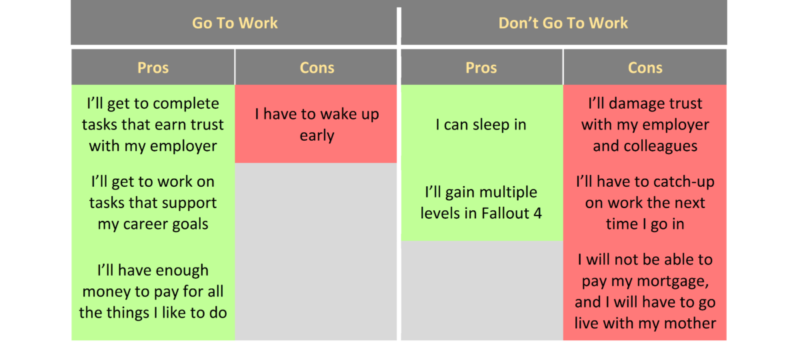Successful people – by any measure – are proactive. They think about what they want their future to look like, and they take steps now to make that vision become reality. This is true, whether you aspire to become a successful business-person, the President, or a minimalist cottage-dweller.
Proactive behavior is what separates the person who gets promoted every year from the person who works harder than everyone else but never makes the cut. It’s what separates the person who retires comfortably at 50 from the person who can’t afford to retire at 65.
But how do you do prioritize the future when you’ve got bills to pay, kids to raise, and job commitments now? How do you find time to build towards some theoretical future when you’ve got urgent tasks today?
The answers are actually simple and intuitive. The trick is the thoughtful intent you put into it. For example, do you wait until you’re sick and take medicine, or do you take your vitamins and eat healthily to avoid getting sick in the first place? Do you wait for a promotion to come up at work, then look through the requirements to see if you qualify? Or do you look up the job posting from when your boss got hired, look through the qualifications, and start working on them now?
This article will help explain what it means to be proactive, discuss the benefits of being proactive, and show you how to become a proactive person yourself.
The topics in this article include:
- How to take a proactive mindset and shed a reactive mindset;
- How to understand the different types of control; and
- How to take control through the language you use.
Let’s get started.
What does Proactive mean?
Active means ‘doing something’, and the prefix pro means ‘before’; so, if you are proactive, you prepare for something before it happens. The opposite is being reactive, or waiting for things to unfold before you determine a response.
For example, imagine flu season is coming; a proactive person washes their hands and gets vaccinated, while a reactive person will get sick and take medicine.
So, if you’re a proactive person, your actions dictate how things happen; If you are reactive, you allow those things to dictate your actions.
What is a Proactive Mindset?
It’s true that you cannot always control your environment; however, what you always control is your preparation and your response.
“Your behavior is a function of your decisions, not your conditions”
Stephen Covey
Here’s an example of a proactive approach toward the achievement of a career goal:
Imagine you’ve set a goal to earn a promotion to manager within one year. You start by gathering information on upcoming manager vacancies. Next, you look up the job description for other manager roles in the organization, and job postings for similar jobs to determine the competencies that you’ll need. Armed with that information, you enroll in free online courses and volunteer to do work that gives you the competencies you’ll need to be fully qualified for the next available manager position.
Of course, you can’t always anticipate things so clearly, but by taking a proactive stance, you will be as prepared as possible when the opportunity comes up. One of my favorite quotes, and one I cite often, pertains to this – maybe you’ve heard it:
“In preparing for battle I have always found that plans are useless, but planning is indispensable”
Dwight D. Eisenhower
I typically see this quote trimmed down to something like “plans are useless, but planning is everything”.
What this quote says is that your plan itself probably won’t unfold so predictably, because variables change. However, the preparation will put you in a position to respond and adapt your approach. I’ll use a cliché: “the road to success is not a straight line”.
Here’s an example of a situation where the plan itself isn’t a success, but the planning leads to a success anyhow:
Imagine you want to buy a house, and you want it to be in a specific neighborhood. You prepare a budget, research the best mortgage terms, read about the risks, hire a realtor and a mortgage broker, gain approval for a loan, and find the house of your dreams. You’re all set!
Then, the city announces that a new school is going to be built in that neighborhood, and the price of homes in the area jump beyond your budget. Fortunately, due to all the planning you’ve done, you’re prepared to make the adjustment. You are entirely prepared to purchase a home – all you need to do is find the next best neighborhood.
Sometimes our choices have negative consequences; these are called mistakes. Everyone makes mistakes (highly successful people make them constantly), and they cannot be undone. The proactive approach to a mistake is to acknowledge it immediately, correct it if possible, learn from it, and wash your hands of it.
Tip: Organizations should encourage creativity and resourcefulness from proactive individuals in order to create a proactive culture within the organization.
Proactive People Versus Reactive People
Proactive people are not born. Proactive people are those who have adopted a set of behaviors that make prepare them for the future. Some people do this unconsiously, and some do it very consciously and methodically. Either way, anyone can be predominantly proactive or reactive. The first step is to understand the difference:
Reactive people:
- Focus their efforts on things that concern them, but over which they have no control (e.g. the weather, celebrities, politics in other countries..)
- Focus on negativity and weaknesses
- Their attitude results in blame and accusation, reactive language, and increased feelings of victimization
- Their negative energy, combined with neglect in areas they could control, causes their influence to shrink
Proactive people:
- Focus their efforts on things that are in their control
- Focus on positivity, strength, and opportunities
- Their attitude results in positive energy and continuous accomplishment of effective goals, which causes their influence to grow
Control
“Between stimulus and response, (a person) has the freedom to choose”
Stephen Covey
As discussed, not everything is in your control; and on the flip-side, there may be many more things in your control than you thought. Learning how to identify what truly is in your control will help you develop your proactive mindset and goals. (Learn how here)
It’s equally important to develop a habit of shedding the concerns that are out of your control, feeling great about it, and moving on.
So let’s talk about control. According to Stephen Covey, there are three kinds:
- Direct control: Involves our own behaviour, and is influenced by our habits. Examples include choosing to smoke a cigarette, choosing to go to work, choosing to go to bed early, etc.
- Indirect control: Involves other people’s behavior, and is influenced by our methods of influencing others. For example, when someone is rude or angry with you, you can listen to them and try to understand, or you can become defensive and argumentative.
- No control: Involves aspects of our lives that we cannot influence; we must accept and learn to live with them, even if we don’t like them. For example, you can’t control the weather or the economy.
The language you choose to describe a circumstance has a powerful influence on the way you perceive and approach that circumstance.
For example, imagine your alarm clock goes off, telling you it’s time to get up and go to work. You don’t want to go, but you tell yourself “I have to get up, because I have to go to work”.
What’s wrong with this?
- Well, it’s not true. You don’t have to go to work. There is no magical force that’s going to transport you to your workplace. You can no-show for your shift, or you can call in sick.
- Using this type of language (“I have to”) disrespects the agency you have in your life. It can make you feel like you’ve been compelled to do something against your will, your life is out of your control, or you’re on auto-pilot.
- This type of language can cause you to experience demotivation, loss of confidence, loss of sense of self, and resentment.
At first glance, this may seem a bit over-optimistic. Of course we have to work, right? Well, with practice, you’ll come to understand that every action you take is the result of a choice between between consequences.
I’ll break down the ‘go to work’ example from my perspective, to show you what I mean:

In this example, I would choose to go to work, because I prefer the outcomes. However, someone else may really want that extra sleep, and be totally happy with moving in with their mother. They may choose to stay home, and they have the freedom to make that choice.
The point is that every single action you take involves a decision between alternatives; your decision, consciously or not, will be the one that aligns most closely with your principles.
You can try this with anything that you think you’ve been forced to do (the chores your spouse asks you to do, the bills you pay, your homework, your errands, etc).
Language Matters
Get in the habit of identifying and ridding yourself of reactive language, and whenever possible, work with proactive language. In doing so, you will become more honest and accurate with what is truly in your control, and what is not. Start right now.

Final Thoughts
- Do you have any examples where you used a proactive approach to achieve great results?
- Have you identified anything that you thought was out of your control, but found that it is actually in your control?
- Do you have any advice or habits to help a person achieve a proactive mindset?
When it comes to mindset, the language you use matters A LOT. Which of these are you guilty of? pic.twitter.com/AroPX62IAV
— Chris (@ChrisjBergen) February 21, 2020
Want to learn more about being proactive? Try the following articles:




